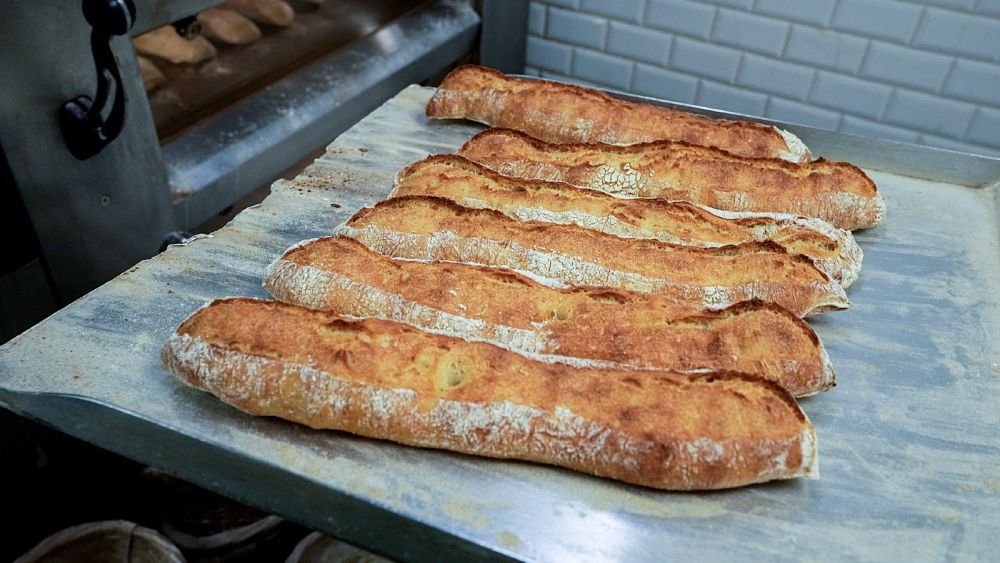
A hike in the cost of wheat is alarming French households who fear a possible rise in the price of the prized baguette, seen by many as a barometer of the country’s economic health.
Many boulangeries around France are putting up signs, warning customers that the long, crunchy staple could be going up in price by 5 to 10 centimes, from its average of about 89 centimes.
“Although that might not seem like a lot, it’s a huge increase. The baguette is precious. It has only gone up 23 centimes in the last 20 years,” said Dominique Anract, president of the French Confederation of Bakeries and Pastry Shops.
The price hike fears are linked to a 30% worldwide increase since September in the price of wheat — one of the baguette’s key ingredients — after bad harvests in Russia and Canada, Anract said. Rising energy costs are making ovens more expensive to operate and an increase in wage costs are also factors.
“The situation is unprecedented because we have never had all these elements at the same time, of this size. And it comes at the wrong time when the pandemic has led to a drop in cash flow for some bakers,” Anract said.
10 billion baguettes a year
France’s 67 million people are voracious consumers of the baguette. The country’s “Bread Observatory” — a venerable institution that closely follows the fortunes of the famed 65-centimetre loaf — notes that the French munch through 320 baguettes every second. That’s an average of half a baguette per person per day and 10 billion every year.
Anract said that every increase in the price of the baguette “is dire when played out nationwide”.
“The baguette is our emblem, our symbol, the thermometer of our economy. It’s perhaps like Britain’s pint of milk. It can never go beyond one euro,” he said.
Marc Cohen, a 35-year-old father of two, said outside his local baker in the Le Marais area of central Paris that rising baguette prices “would be a pain in the neck. Costs are going up everywhere. Even 5 centimes is a lot because we get one every day. That adds up over the year, and next year it will probably be the same.”
Calling it “depressing news,” 43-year-old engineer Franck Nguyen said “the baguette is an institution in France. If the price goes up by too much, there will be big opposition.”
Anract stressed however that many bakeries may shield consumers from the increase “because they are banking on prices coming down.”
“Bakers negotiate individual contracts with millers, who compete with each other and who may decide to smooth out the increase in wheat prices in order to maintain their relationship with their customers,” he explained.
“Moreover, not every baker has the same baking method, nor the same oven. Electricity is a bigger expense for small businesses, which need to run their ovens all day, sometimes to serve only a few dozen baguettes in the middle of the afternoon to their customers… Itinerant bakers, for example, who make their rounds in the villages, are mainly affected by the rise in fuel prices,” he noted.
Let them eat baguette!
Although the baguette seems like the quintessential French product, it was said to have been invented by Vienna-born baker August Zang in 1839. Zang put in place France’s steam oven, making it possible to produce bread with a brittle crust yet fluffy interior.
The product’s zenith did not come until the 1920s, with the advent of a French law preventing bakers from working before 4 a.m. The baguette’s long, thin shape meant it could be made more quickly than its stodgy cousins, so it was the sole bread that bakers could make in time for breakfast.
French Culture Minister Roselyne Bachelot has even nominated the baguette for a place on UNESCO’s Intangible Cultural Heritage List next year.
Bread has often stirred French passions. Marie Antoinette’s famously misattributed quote, “Let them eat cake,” was one of the supposed triggers of the 1789 French Revolution.
Yet Anract was sanguine about the immediate future.
“In the Revolution, there was a penury of bread, there was not enough of it,” he said. “It wasn’t about the price of bread. We’re not at that stage yet!”